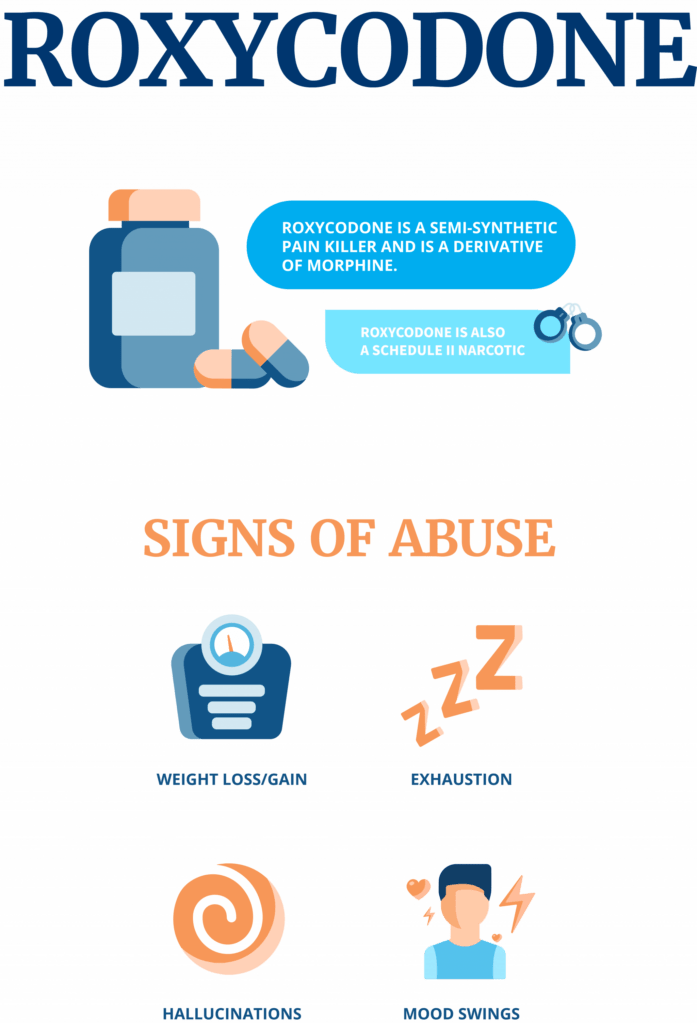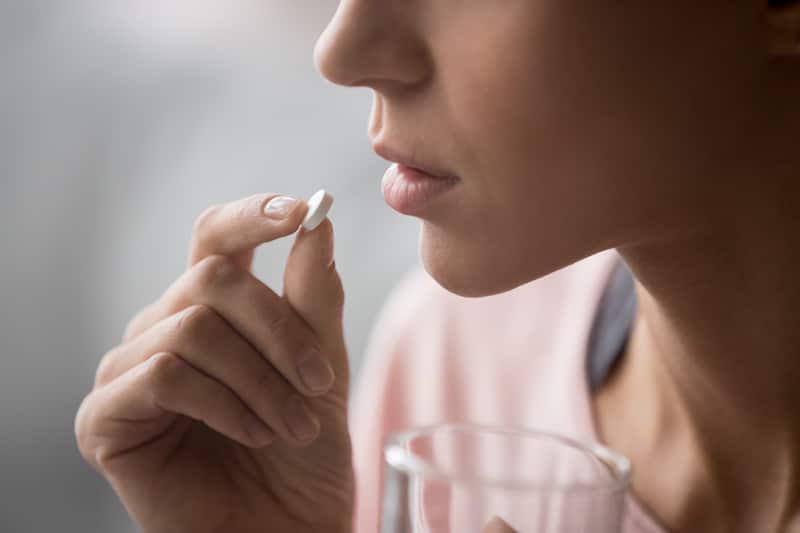Roxy is a street name for the powerful opioid Roxicodone (Roxycodone). It is prescribed to treat pain untouched by non-opioid pain relievers. Similar to heroin, Roxycodone abuse can cause severe withdrawal symptoms and require treatment to stop using. But, what are Roxys?
What is a Roxicodone Pill?
Often called Roxy, Roxies, or Blues, Roxicodone is a semi-synthetic pain reliever. A derivative of morphine, the Roxy drug effects include euphoria and sedation. Because of the high risk of Roxycodone abuse, it is a Schedule II narcotic.

Is Oxycodone Generic for Roxicodone?
Oxycodone is the generic name for the prescription drug Roxicodone. However, there are Roxy drug effects that differ from Oxycodone drug effects. The vital difference is, Roxicodone affects the central nervous system. This allows for lasting pain relief for moderate to severe pain.
Furthermore, Roxy is an immediate-release tablet. Besides the pain relief, it also produces an immediate rush of pleasure. This rush makes Roxycodone abuse common and often leads to addiction.
What is Roxycodone Abuse?

Roxycodone abuse happens when a person takes more or in forms other than prescribed. Roxycodone abuse is also taking Roxy without a prescription. Often people abusing Roxy turn to the streets to find the drug.
Generally, Roxycodone abuse happens by crushing and swallowing, snorting, or injecting it. Although this typically increases the already quick-acting drug, it has long-term effects. For instance, snorting Roxy may disintegrate the septum. Furthermore, particles may be inhaled into the lungs, which can lead to death.
What Are the Effects of the Drug Roxicodone?
Common Roxy drug effects include nausea, vomiting, constipation, dizziness, lightheadedness, and drowsiness. While these side effects should decrease over time if they continue, medical attention may be needed.
However, serious Roxy drug effects should be addressed right away. These side effects include:
- mood changes
- confusion
- agitation
- hallucinations
- severe stomach pain
- trouble urinating
- loss of appetite
- weight loss
- exhaustion
Immediate medical attention is needed for severe Roxy drug effects. They include:
- fainting
- seizures
- slow breathing
- extreme drowsiness
- difficulty waking up
Severe Roxy drug effects may also produce rashes, itching, or swelling.
Does Roxicodone Abuse Lead to Addiction?

Roxicodone abuse increases the time it takes to build tolerance and dependence. When this happens, a person must increase their use to achieve the same effects. At this point, a person has generally already developed a substance use disorder.
However, addiction is not often the result of just one reason. Typically, a combination of factors leads to Roxicodone abuse and addiction. These factors include:
- Genetic – Addiction is proven to run in families, even more so when a parent struggles with addiction.
- Environmental – Growing up in dysfunctional homes with chaos and addiction may make drug abuse seem normal. As a result, children may use drugs at a young age.
- Psychological – Mental illness and addiction are deeply connected. People with a mental illness often self-medicate with drugs such as Roxy.
Common Co-Occurring Disorders with Roxicodone Abuse
Struggling with a mental illness and Roxycodone abuse or addiction is also known as having co-occurring disorders. People who battle addiction are generally evaluated for mental illness and often receive a dual diagnosis.
Common co-occurring disorders include:
- Anxiety disorders
- Depressive disorders
- Borderline Personality Disorder
- Conduct disorders
- Antisocial Personality Disorder
- Schizophrenia
Signs and Symptoms of Roxicodone Abuse
The signs and symptoms of Roxicodone abuse vary greatly depending on how much a person takes, how often a person misuses it, and their tolerance level. Roxycodone abuse affects a person’s mood and behavior, along with causing physical and psychological changes.
Mood
- Anxiety
- Depression
- Mood swings
- Irritability
- Anger
- Euphoria
- An overwhelming sense of well-being
Behavioral
- Using multiple doctors to obtain Roxicodone prescriptions
- Making frequent trips to the emergency room complaining of vague pain
- “Losing” Roxy prescriptions
- Tampering with prescriptions
- Borrowing or stealing Roxys and other narcotics
- Withdrawal from friends and family
- Not meets the demands of work, home, and social activities
- Hobbies become unimportant
- Financial problems
- Acting nervous or “sketchy”
Psychological
- Brain fog
- Confusion
- Delusions
- Hallucinations
- Psychosis
Physical
- Slowed or shallow breathing
- An increase in respiratory infections
- Extreme weakness
- Dizziness
- Lightheadedness
- Fatigue
- Bradycardia – or slow heart rate
- Nausea and vomiting
- Constipation
- Increase in sweating
- Itching
- Visual disturbances
- Circulatory depression
- Urinary retention
- Shock
- Seizures
- Cardiac arrest
- Myocardial infarction
- Chest pain
- Nodding off
What are Roxy’s Effects on Your Life?
Roxicodone abuse severely affects every aspect of your life. Not only does it impact your performance at work and school, but the impact on your children and partner is also devastating.
The effects of Roxicodone abuse include:
- Legal trouble
- Incarceration
- Job loss
- Financial struggles
- Homelessness
- Relationship issues
- Divorce
- Major depression
- Anxiety disorders
- Chronic pain
- Seizure disorders
- Coma
- Death
What are Roxicodone Withdrawals?

Roxicodone withdrawals describe a range of symptoms that occur when you suddenly stop or reduce Roxy. The severity of Roxy withdrawal symptoms depends on factors such as amount misused, length of use, and the method of misuse.
Additionally, you do not have to abuse Roxicodone to experience withdrawal symptoms. If you take Roxy as prescribed for several weeks or more, your body develops a dependence. For this reason, a step-down program is best when you stop consuming Roxicodone.
What are Common Roxy Withdrawal Symptoms?
Roxicodone withdrawals are similar to those of opiates such as heroin, methadone, and codeine. You will typically begin feeling symptoms within six hours of last use. Depending on the severity of your Roxyicodone abuse, withdrawals may last up to a week.
Common Roxy withdrawal symptoms include:
- Anxiety
- Depression
- Irritability
- Nausea and vomiting
- Chills
- Intense sweating
- Body weakness
- Runny nose
- Joint pain
- Increase in blood pressure
- Increase in respiratory rate
- Tachycardia – rapid heartbeat
Are Roxicodone Withdrawals Dangerous?
While Roxy withdrawal symptoms are extremely uncomfortable, they are generally not life-threatening. But, like with all addictions, individuals may experience complications that can be dangerous.
For example, you can aspirate. This happens when you vomit and breathe it into the lungs. This can cause choking or a serious lung infection.
However, the most significant danger of Roxicodone withdrawals is when you complete detox and start using again.
This is dangerous because once you go through the withdrawal process, your tolerance is much lower. As a result, you can overdose on the same dose you took before going through Roxicodone withdrawals.
Going through withdrawals is not a treatment for Roxicodone abuse. It is just the first step. Like most addictions, Roxicodone abuse develops because of underlying issues. Attending a comprehensive treatment center such as Discovery Institute addresses and heals past trauma and any co-occurring mental health disorders.
What Types of Treatments are Available at Discovery Institute?

Discovery Institute offers the highest quality comprehensive addiction treatment programs to individuals fighting addiction and their families. Our state-run detox, intensive residential, and outpatient Roxicodone abuse treatment programs focus on each person’s individual needs.
We are located in a quiet and scenic section of Marlboro, New Jersey. Our programs are available to men and women ages 18 and over who struggle with substance use disorders and co-occurring mental and behavioral health disorders.
Our individualized treatment plans guarantee each person receives care that meets their needs and treatment goals. Because we understand Roxicodone abuse is a chronic disease, our relapse prevention program provides the tools you need to sustain recovery.
Therapies for Roxicodone Abuse at Discovery Institute
Discovery Institute offers various therapies in their residential and intensive outpatient programs. These programs include individual and group therapy, family counseling, and holistic therapies.
Individual Therapy
Individual therapy is crucial in treating Roxicodone abuse. It allows you to address issues with family, trauma, emotions, and mental disorders. Treatments in individual therapy may include:
- Cognitive Behavioral Therapy (CBT)
- Dialectical Behavior Therapy (DBT)
- Relapse Prevention Therapy
Group Therapy
At Discovery Institute, you attend group therapy every day. While each session is different, the people you attend therapy with and the therapist doesn’t change. This helps build a sense of trust, respect, and support.
The benefits of group therapy include:
- Provides support
- Offers encouragement
- Builds healthy social skills
Family Therapy

Roxicodone abuse affects the entire family. At Discovery Institute, we believe it’s crucial to provide guidance and education to build healthy homes. Families join their loved one every few weeks as well as when the therapist finds it necessary.
Holistic Therapy
Holistic therapies treat Roxicodone abuse by healing the body, mind, and spirit. Many people find the benefits of holistic therapies far outweigh traditional therapies and medication.
Holistic therapies at Discovery Institute New Jersey include:
- Yoga
- Meditation
- Reiki
- Acupuncture
- Nutritional therapy
- Music therapy
- Nature therapy
Why is Relapse Prevention Important in Roxicodone Abuse Treatment?
Relapse is common in recovery. But, creating a solid relapse prevention plan can go a long way in stopping you from using again. At Discovery Institute, we work with you to follow if you think Roxicodone abuse is a good idea.
Signs of Roxicodone abuse relapse include:
- Lying or keeping secrets
- Stealing or borrowing money
- Changes in mood and behaviors
- Skipping meetings or therapy
Do Drug Rehab Centers in NJ Help with Roxy Abuse?
The Discovery Institute can provide treatment for substance abuse and dependency, including Roxy and other opioids. Through detox and individual, group, and family therapies, our treatment will get you sober and down to the root cause of destructive behaviors like drug abuse. If you know someone struggling with drugs or alcohol, contact Discovery Institute today for help.
Dr. Joseph Ranieri D.O. earned his BS in Pharmacy at Temple University School of Pharmacy in 1981 and His Doctorate Degree in Osteopathic Medicine at the Philadelphia College of Osteopathic Medicine in 1991. He is Board Certified by the American Board of Family Medicine and a Diplomate of the American Board of Preventive Medicine Addiction Certification. Dr. Ranieri has lectured extensively to physicians, nurses, counselors and laypeople about the Disease of Addiction throughout New Jersey and Pennsylvania since 2012.



